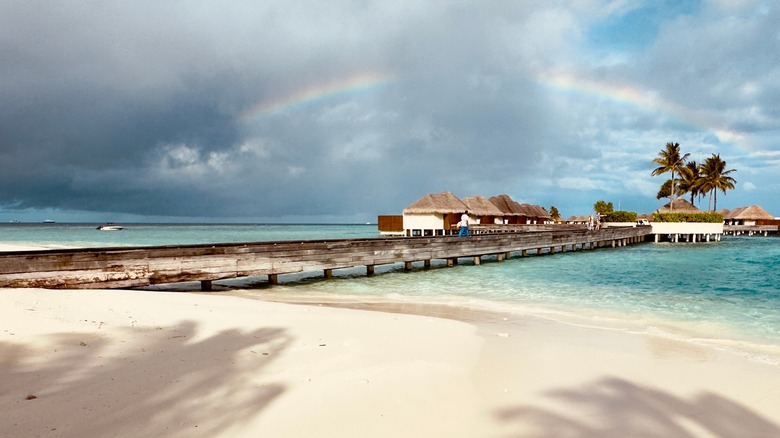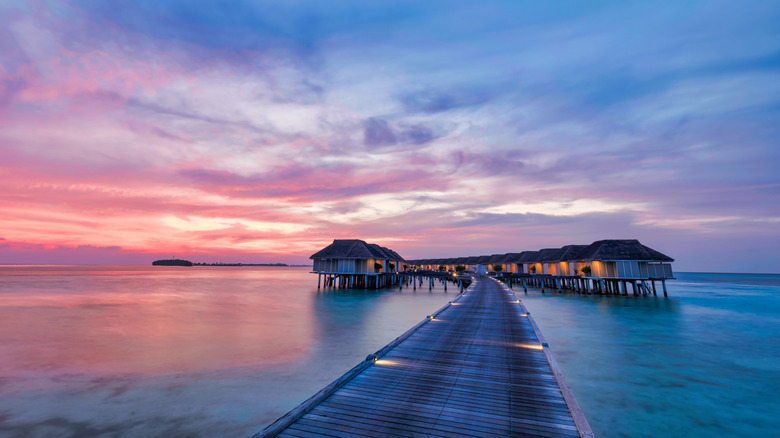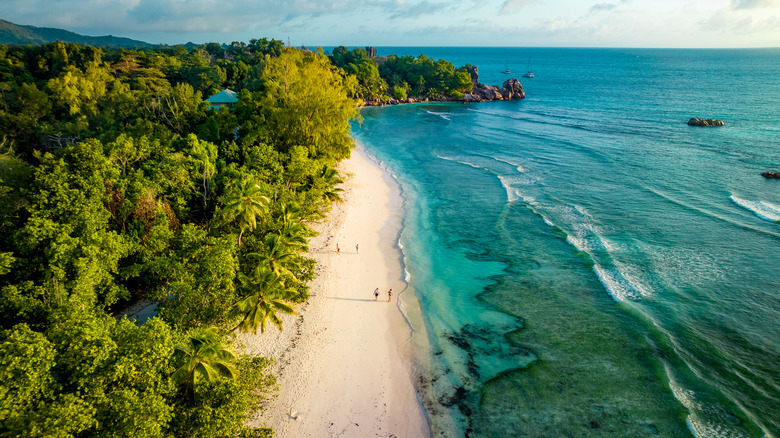What Makes The Maldives A Potentially Dangerous Vacation For LGBTQ+ Travelers?
With long, white beaches and turquoise waves, it's no surprise that the Maldives is a popular honeymoon destination for all couples — including LGBTQ+ couples. However, in the Republic of Maldives, there are laws against being in a relationship with someone of the same sex. Although the Maldives does not have specific laws against forms of gender expression, like Brunei and Oman do, transgender travelers are often unsafe in countries with hostile attitudes toward members of the LGBTQ+ community. So is it safe for queer travelers to seek out a romantic trip to the Maldives?
To find out how concerned travelers should be about this potential destination, Islands spoke to Duncan Greenfield-Turk, CEO of Global Travel Moments, a travel agency specializing in creating personalized trips for LGBTQ+ travelers. Greenfield-Turk said that safe travel in the Maldives is possible for LGBTQ+ people if they practice discretion But the CEO warned that if you're planning to leave a private resort, being visibly out can be dangerous. "Public displays of affection, same-sex relationships, and LGBTQ+ activities are considered punishable offenses, which can include jail time, fines, and even corporal punishment," Greenfield-Turk said. "The country's overall legal framework poses a risk for LGBTQ+ travelers, especially if their sexual orientation becomes known outside of tourist zones."
Stay at a welcoming resort in the Maldives
Whether you're planning a romantic getaway for you and your partner or are hoping to bring your entire family to a kid-friendly resort in the Maldives, you're going to want to make sure you're visiting a place where you and those you love can feel safe. According to Duncan Greenfield-Turk, if you're looking for LGBTQ+ welcoming resorts in the Maldives, you should consult the website for The International LGBTQ+ Travel Association. In general, he advised: "Opt for internationally recognized resorts that have experience hosting LGBTQ+ travelers. Some luxury properties have staff trained to ensure an inclusive and welcoming environment."
While the downside to booking an all-inclusive resort is that you get a less authentic experience of the destination you're visiting, you're at a much greater risk if you leave your resort to explore local communities. Greenfield-Turk advised being discreet and avoiding all public displays of affection or mentioning your sexuality outside of your resort. "The risk of legal consequences arises when LGBTQ+ behaviors or relationships become publicly known or are displayed in non-tourist areas," Greenfield-Turk said. "It's highly recommended to avoid venturing into local communities where cultural and legal norms are strictly enforced."
Alternative destinations for LGBTQ+ travelers
If a trip to the Maldives feels too risky, don't worry. There are plenty of other welcoming, LGBTQ friendly islands that you can expore instead. If you were interested in the Maldives but are open to friendlier alternatives, Duncan Greenfield-Turk recommended considering Mauritius, Seychelles, or Greek islands like Mykonos — all of which have beautiful beaches and are more friendly to LGBTQ+ visitors.
In 2023, being gay was officially decriminalized in Mauritius, making it a great choice for LGBTQ+ travelers interested in spending their time at a beachy island resort. Seychelles [pictured], which Greenfield-Turk called "a safe and stunning alternative to the Maldives," not only decriminalized same-sex relationships back in 2016, but the nation has also passed protections for its gay citizens, protecting them from discrimination in the workplace. While Greece may not have the same tropical climate some tourists crave, its popular beaches are world famous. Not only is gay marriage legal in Greece, Mykonos has a long history as a destination for LGBTQ+ travelers, so you'll find plenty of gay clubs and bars there.


